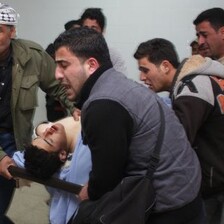The Electronic Intifada 24 March 2010
RAMALLAH, occupied West Bank (IPS) - Many Israelis like to believe, and the cliche is repeated regularly in Israel, that their army is the “most moral army in the world.”
However, following the Gaza war which left 1,400 Palestinians dead, most of them civilians, some Israelis have begun to question this.
Furthermore, the fatal shooting of four Palestinian teenagers in the course of 24 hours over the weekend, in highly questionable circumstances, has forced the Israeli military to investigate the incident amidst contradictory statements issued by the soldiers involved.
In the last few weeks violent protests have been breaking out all over the occupied Palestinian West Bank, including East Jerusalem, in protest of Israel’s continued Judaization of the eastern sector of the city.
This has involved the ethnic cleansing of Palestinians from occupied East Jerusalem to make way for illegal Israeli settlers.
Other measures, aimed at curbing the demographic presence of Palestinians, have included limiting building permits for Palestinians despite a chronic housing shortage and demolishing homes built “illegally.”
Tempers reached boiling point recently when the Israeli government declared plans to build thousands of new apartments in East Jerusalem and extremist Jews tried to enter the al-Aqsa Mosque, Islam’s third holiest shrine.
Alarmed at the volatile demonstrations sparked in villages and towns across the occupied West Bank, Israeli security forces have been cracking down on grassroots activists with arrest campaigns and declaring some villages closed military zones.
Inevitably the closed military zone orders in the villages of Nilin and Bilin near Ramallah were ignored so the Israeli army began to employ lethal force there and elsewhere.
Kelly Stark, an American activist with the International Solidarity Movement, was shot at close-range with a rubber-coated metal bullet the size of a large marble. Israeli military law says the bullets can only be shot from a distance of 40 meters and at the legs.
Stark was not involved in stone-throwing and was standing with a group of medics. She underwent surgery to remove the bullet lodged in her arm which fractured her wrist.
Ussayad Qaddous, 19, and his cousin Muhammad Qaddous, 16, died over the weekend after Israeli soldiers used live ammunition during protests in the village of Iraq Burin in the northern West Bank.
Clashes erupted after Palestinian protestors tried to reach village land that has been confiscated for the adjacent illegal Israeli settlement.
Eyewitnesses state that the two cousins were not involved in the protests and that calm had returned before Israeli military jeeps reinvaded the village, sparking fresh confrontations.
Ussayad was shot in the back of the head while Muhammad was shot through the torso. The Israeli military initially denied using live ammunition and stated that only rubber-coated metal bullets had been used.
However, x-rays and pictures taken, showing a bullet lodged in the skull of Ussayad and the entry and exit wounds on Muhammad’s torso, suggest otherwise and have been corroborated by the testimony of doctors.
“The [Israeli army] uses two types of rubber bullets; one is shaped like a ball and the other is cylindrical. The object lodged in Ussayad’s skull is shaped like a prism, pointed at the end. It’s a bullet,” Israeli activist Jonathan Pollack from Anarchists against the Wall told Maan News Agency.
“There is an entry wound and an exit wound in Muhammad’s torso, and no rubber bullet in the world can cause such an injury,” added Pollack who was backed by doctors who examined the bodies.
The Israeli military was eventually forced to retract its initial denials and admitted that it had used live ammunition, adding that had the soldiers involved not violated the correct procedures of engagement the cousins would still be alive.
Israeli human rights group B’Tselem has asked the army to conduct a criminal investigation into the killings.
On Sunday, shortly after the fatal shootings in Iraq Burin, two other Palestinian teenagers, both 19, from the nearby village of Awarta were shot dead as they approached their agricultural land carrying farming equipment.
Muhammad Faysal and Salah Qawariq were accused by soldiers, from the same brigade responsible for the deaths of the Iraq Burin teenagers the previous day, of being “terrorists disguised as farmers who had attacked them alternatively with pitchforks, then broken glass, then bottles with pebbles in them, and finally with a syringe.”
Once again the Israeli military has opened an investigation after Israeli military police stated “events at Awarta reveal discrepancies.”
Meanwhile, The Coalition Against Racism and the Mossawa Center, which work to promote equality in Israel, have accused the current Israeli Knesset, or parliament, of being the “most racist since the country’s founding.”
They state that 21 bills aimed at discriminating against Israel’s Arab citizens have been presented to the Knesset during the last year.
Included is a proposed legislation that would imprison for a year anyone who publishes or says anything that would “bring contempt upon or discomfort to the country.”
Other bills mentioned involve exclusive sale of land to Jews and an attempt to change all street names in Israel to Hebrew only.
All rights reserved, IPS — Inter Press Service (2010). Total or partial publication, retransmission or sale forbidden.





